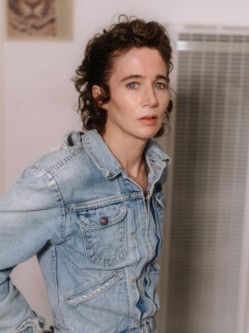
Miranda July in conversation with Lexie Smyth about her novel, All Fours
You work in multiple forms of media—why did you decide to tell this story as a novel?
It's somehow never a matter of having an idea and then deciding the medium—the medium is part of the idea. I was putting notes into a file called "Novel 2" for about a year, while working on another project, before I finally sat down to write. The file, and eventually the novel, was the right container for such an intimate story. I tried so hard to get into dark interior corners, parts of myself and the culture where light rarely shines—narrow conceptions of women, desire, aging—that we carry around without even knowing it. It's an exciting territory because radical change can come so easily after awareness dawns.
All Fours does not shy away from the visceral, intense, and often challenging pieces of womanhood and motherhood. How does it feel to be able to reflect on these aspects of life that are not often represented in literature?
It felt both scary and kind of exhilarating to purposely hang out in territory that has long been described as icky or sad or embarrassing. You've been told so much about how to be a young woman, you're marketed to, you're represented on film and TV, there's so much over-involvement in your reproductive life. But that information abruptly stops! You're actually hunting for basic facts about what happens next. The portrayal of women at mid-life is actually so shabby that it reverses the truth—in your thirties you would have no way of knowing that an exciting, heart-pounding, almost psychedelic surprise was coming. Whereas in the first half of life you were told what to expect and perhaps have been disappointed.
If you could describe All Fours with a sound, a color, and a texture, what would they be?
Ha! Okay, the sound is the sound of two women talking, lots of laughing and crying. The color would have to be the golden, pinkish-orange color of the light coming through the motel curtains in room 321. The texture is that of a woman's skin when she's not young anymore, so impossibly soft.
What would you describe as being the heart of All Fours?
I started writing this book when I was forty-five. For the first half of life, you're looking forward to some obscure apex, you're feeling like a young person, really for quite a long time as a woman. But then suddenly that flips. The vantage changes: you're in the middle and you're looking toward death, you're suddenly not an ingenue. Perhaps you can't keep living as you did before, and yet the road ahead appears to be so narrow and dimly lit ...
Instead of keeping all these thoughts in shadows, where they get scary, I wanted to openly wonder, as I have at every age, what does this mean? Practically, sexually, emotionally, in terms of intimacy? Those questions are at the heart of this book. Now, at forty-nine, I feel lucky that I got to live these very important years alongside my narrator; she was an exciting yet comforting companion all these years. And now it is time to share my friend.
Unless otherwise stated, this interview was conducted at the time the book was first published, and is reproduced with permission of the publisher. This interview may not be reproduced or reprinted without permission in writing from the copyright holder.




There is no worse robber than a bad book.
Click Here to find out who said this, as well as discovering other famous literary quotes!
Your guide toexceptional books
BookBrowse seeks out and recommends the best in contemporary fiction and nonfiction—books that not only engage and entertain but also deepen our understanding of ourselves and the world around us.